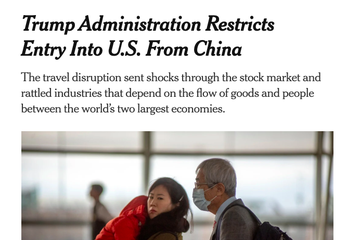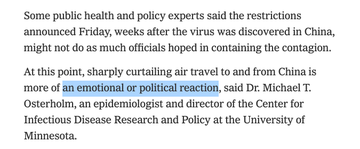The coronavirus pandemic has become a health crisis that’s almost unprecedented in our lifetimes.
As our country and the world race to contain the spread of COVID-19, it’s important that we all stay informed on how to protect ourselves and our families and neighbors.
This is a time for journalists in a free country to demonstrate how they can bring vital and accurate information to the public when it’s needed most.
Many journalists have been doing just that, and at great risk.
Unfortunately, the media has made some serious missteps in recent months and acted unseriously in this serious time.
Here are three big media misses during the coronavirus pandemic.
1. Attacking Travel Bans
While there is certainly more that Americans and the Trump administration could have done in preparation for the tidal wave that has been the coronavirus outbreak, one early decision likely made a big difference in controlling its scope.
On Jan. 31, the Trump administration instituted a travel ban to stop the flow of infected people from China to the United States.
“The travel ban with China made a difference,” Dr. Tom Frieden, former director of the Centers for Disease Control and Prevention and current head of the global health initiative Resolve to Save Lives, told USA Today.
“It resulted in a significant delay in the number of people coming in with infection and because of that, that bought time in the U.S. to better prepare,” Frieden said. “And yet, that time wasn’t optimally used.”
However, critics of the Trump administration roundly attacked the China travel ban as ineffectual, anti-science, and xenophobic.
My colleague, Lyndsey Fifield, had an excellent breakdown on Twitter of the media’s coverage of the travel ban.
Good on the administration not to rely on information that had gone through the filter of the Chinese communist government, which clearly has been dishonest about the outbreak since the beginning.
But media outlets didn’t stop with attacks on the administration’s China travel ban. They also widely condemned the more recent restriction on travel from Europe—some calling this move a product of xenophobia as well.
The fact is, contrary to the idea that viruses don’t recognize borders, borders are an important method to limit contact with people infected in a global pandemic. It’s the transmission between individuals that causes COVID-19 to spread quickly, one of the reasons why our whole country is practicing various forms of social distancing and in some places is in near total lockdown.
The idea that the federal government took precautions and shut down borders to prevent the spread of COVID-19 is anathema in a media environment in which the concept of borderless societies is taken as a given.
But if this moment demonstrates anything, it’s that border enforcement matters. It matters not just because of issues such as crime, culture, terrorism, and economics, but also in the realm of public health.
2. ‘China Virus’ Language Policing
Working alongside the attacks on travel restrictions is the media’s ridiculous and unserious condemnation of those who call the new coronavirus the “Chinese virus,” “China virus,” “Wuhan virus,” or any other name that links the pandemic to its country of origin.
In January and February, most media outlets had no problem using the terms China virus or Wuhan virus. But suddenly a switch flipped, and prominent journalists began to attack these terms as racist.
This flip-flop followed a wave of Chinese propaganda aimed at attacking the term “China virus” as racist and linking the outbreak to the United States.
It was a jarring reminder of the unserious nature of “woke” culture that at a press conference the day after Trump used the phrase “Chinese virus” on Twitter, he received four questions about it.
Clearly, when the nation is shut down due to the most threatening pandemic since the Spanish flu and Americans are facing mass unemployment and possibly a deep recession, our esteemed press is doing the all important work of language policing.
3. Trump Derangement and Fish Bowl Fluid
Unfortunately, this big media miss may make it more difficult to...

















